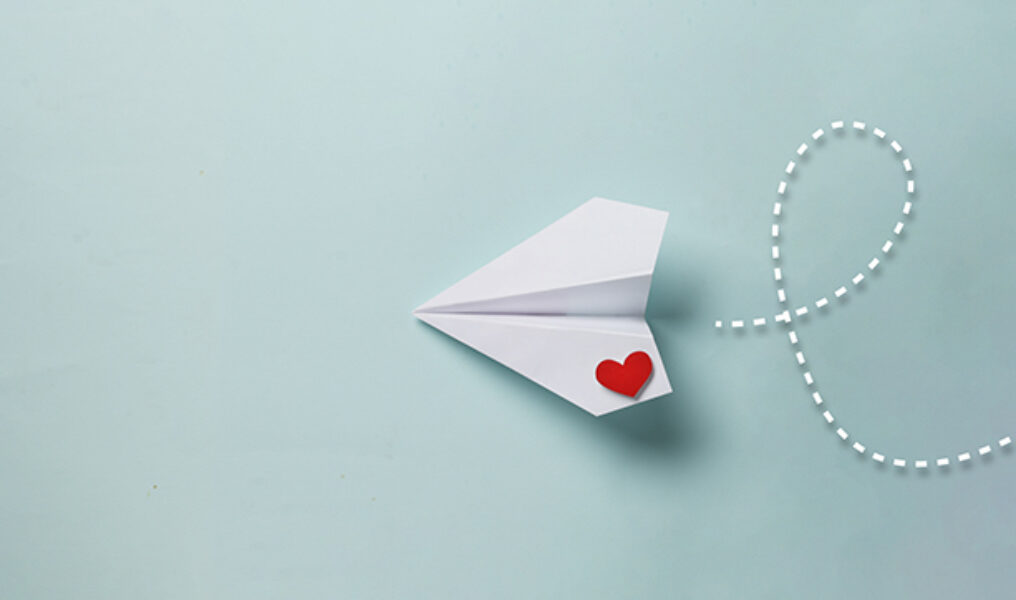Emily Dievendorf had a problem.
The advocacy director for the Lansing Association for Human Rights (LAHR) noticed the loneliness and isolation often felt among members of the LGBTQ+ community and other marginalized groups was exacerbated by the constraints of Covid. Contributing to the devastation brought on by the pandemic were existing factors such as family rejection, mental health concerns and physical illness like HIV/AIDS. Of special concern to Dievendorf were BIPOC and transgender individuals, who can be particularly susceptible to social isolation.
"We know that our communities are especially vulnerable, in that we may very much need each other and our found and chosen families," said Dievendorf, who is queer nonbinary and uses she/they pronouns (they/them for the purposes of this article).
Dievendorf's task was to find a way to combat isolation without increasing the risk of exposure to the virus. They and their colleagues came up with an old school answer.
"One thing that we all like to get is mail," Dievendorf said. "And so, we started to talk about that."
Sometimes Art House (SAH) is a Lansing- and Detroit-based art collective founded by women artists of color to encourage collaboration and self-care in the artistic process. After reaching out to SAH, which nurtures artists who are BIPOC, femme, trans and nonbinary, the Love Notes Project was born.
Each "note" is a card featuring either an artwork of original design or a quote with a LAHR logo created specifically for the project. With options to send a card, receive a card or both, individuals add their own message to the card they choose in the online form and may include their contact information if they wish. There is also an option for the sender to receive a picture of their personalized note before it is sent. Participation is free, but individuals are encouraged to make a donation to cover postage. There is no limit on the number of cards one may give or receive.
"This is one way where we can allow other LGBTQIA people to send messages of love without necessarily making themselves unsafe if they don't feel safe enough to share who they are," Dievendorf explained. "They can, if they want to, put their names and contact information in their correspondence, but they don't have to. It can be an anonymous love note."

Baz Pugmire
One of the featured postcard designs is by digital artist Baz Pugmire. It depicts Stonewall activist and icon Marsha P. Johnson on a gold background with the words, "No Pride for Some of Us Without Liberation for All of Us." Pugmire, who is nonbinary and uses they/them pronouns, created the image on an iPad using a digital app. It's a piece that began as an assignment for an internship that they later reworked. Originally, it included other Stonewall figures.
"In our community, these are our heroes," Pugmire said. "These are people that you should be looking up to and honoring."
"That's really [the] one if I was to say, 'this is the piece that I'd want people to know me by,' it would be the Stonewall piece because I think it really speaks to the true roots of the queer resistance movement," they added.
Other cards include quotes like, "You Are Seen, You Belong, You Are Loved As You Are"; "We Are Family"; "I'm Still Fucking Here"; and words from Audre Lorde, "There Is No Such Thing As A Single Issue Struggle Because We Do Not Live Single Issue Lives."

While it seems obvious that getting a positive note in the mail would be a boon to its recipient, Dievendorf pointed out the project is meant to benefit the sender as well. "It's just about strengthening and supporting social networks," they said, emphasizing the importance of building caring families.
"This is being done for the good of it being done," Dievendorf said. "It's just goodwill."
Also benefiting from the project will be LAHR and SAH, as packs of the cards will be available at The Resistance, a bookstore soon to open in Lansing. Proceeds will be split evenly between the two organizations with no profit to the bookstore, which Dievendorf described as being "focused solely on our communities that are affected by discrimination and oppression."
LAHR and SAH are just getting word out about the project and they've had a handful of orders, said Dievendorf.
"It is also important that we start getting people signed up to send cards because holidays are so tough for social isolation," Dievendorf said, "especially those who are feeling a sense of rejection from families. And I also feel that as a queer nonbinary person."
The Love Notes Project exists to nurture the invisible bonds that connect our families: found, chosen or otherwise.
"Regardless of where we are, there is family," Dievendorf said. "Because one thing that I always like to say, whenever anyone of us is feeling alone and left out of their traditional family structure, is that your family is so much bigger than you can ever realize."
Become a part of the Love Notes Project by using this form.










